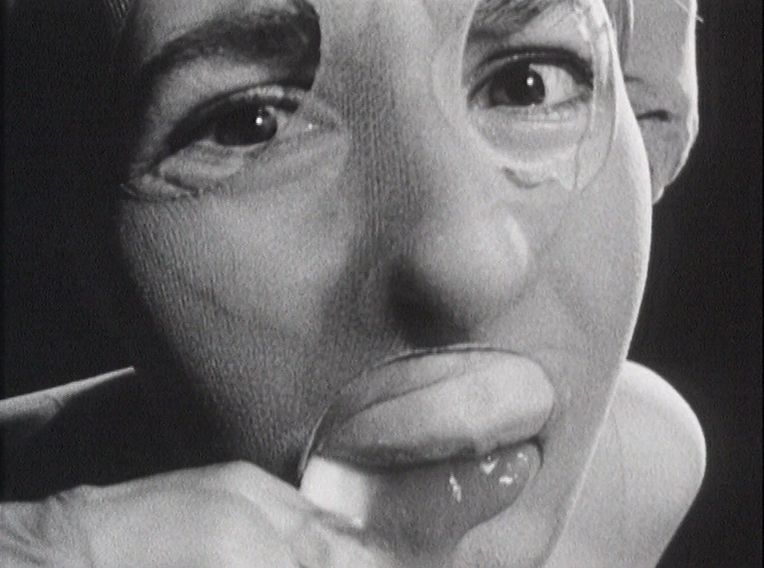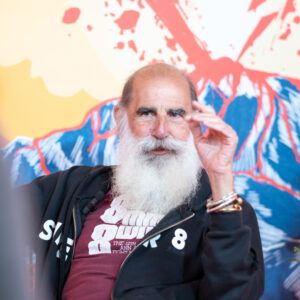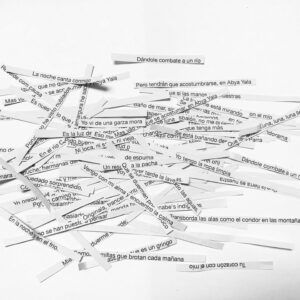For this 12th edition of (S8), Dietmar Schwärzler –an outstanding representative of the Austrian cooperative and distribution company of experimental film sixpackfilm– has curated a program where artist Mara Mattuschka and her “corporeal” cinema is given a special place: our audiences will be invited to enjoy three of her films. Down below you’ll find a selection of excerpts from the conversation between Peter Tscherkassky and Mara Mattuschka that was featured in the book GEGENSCHUSS – 16 Regisseure aus Österreich edited by Peter Illetschko.
Tscherkassky: In most of your films sexuality plays a central role. You almost always also bring in your body. What role does it play in your work?
Mattuschka: I use the body as an instrument as well as an expression of an idea. There is the idea of body and the reality of the body and the physical sense of the body. The more I become aware of these things, the more the body becomes an instrument. In this way, my female body becomes the best instrument that I know. There is nothing else that I can use equally as well. For me, it is brush, pencil, and thought. But I don’t want to break any taboos. I never wanted to do that. If someone wants to break taboos, then they remain on the surface. Works only achieve depth when one lets in what is truly theirs. But for me it is never directly about sex. I want something psychological and I express it with the body as a means, with the language of the body. That’s how the erotic element enters. But I have a very physical relationship to the world, more so than linguistic. That is also a very basic motif that appears in my films: non-verbal understanding. That also has to do with painting, optically grasping an object. It is possible to masturbate and while doing so, to stare at the radiator and all at once you realize that the radiator is a part of you and also a thing in and of itself.
What does that have to do with masturbation?
It has to do with assimilation. Painting is also a process of assimilation. You inhale an object and then give it back again – naturally not in its entirety, but you give back a part of its essence.
So a symbolic representation and eroticization of the relationship to the outer world?
An embodiment! It is almost as if you were to eat an object. This embodiment has the effect that you are completely present and you form a unity. In action painting it’s the strongest. There, every movement is simultaneously a thought and impulse of feeling. Movement and mind form one unit.
You often present your face and your body as distorted and ugly or smeared with paint that looks almost like dirt. Is that simply a rebellion against our body aesthetics?
There are certain elements that I use over and over again, they have a different meaning each time. For me, dirt is a sign with various meanings. In Loading Ludwig, for example, I interpreted the tracks in underpants as a written track – the written-language of the underpants – and as “culture”: the flowing transition between “biologism” in the form of the ass and “civilization” in the form of the underpants: A sign of the excrement on a calendar. Like toilet paper, which is also a calendar: something constantly recurring and yet different every day. These things point to the transience, which is otherwise repressed.
Your perhaps most poignant film in the sense of being aphoristic is Es hat mich sehr gefreut. Also here you use extremely hard and contrasting film material. To what extent do these formal aspects play a role in terms of content?
I had already used this material much earlier. For me, it almost has the character of writing, this black on white, it creates a written-image. Loading Ludwig has many shades of gray. The short films, however, are like a single sentence. And with this material the entire film becomes like a written character. In Es hat mich sehr gefreut the sunglasses play the main character. At first I wanted Mimi Minus to wear the glasses as a shield while masturbating. Then I turned it around: She takes off the glasses. In life she is incognito, in her sexuality she reveals herself – she opens up to the world.
*
Your alter-ego, Mimi Minus, has what are perhaps childish traits. How old do you feel?
I am just about between eight and 80, and in such a way that it is younger than eight and older than 80. And I attempt to comprehend and love the obvious. Without too much superstructure. The older I am, the simpler it gets. In my childhood I was completely different, much more grown up! Back then I always tried to figure things out and to create logical constructions. And at times, that had dramatic results. For example, I had an exact theory of how children are created. I thought; bio-elements pass from the man to the woman. But what I didn’t know was why only married people had children and how the bio-elements knew that the two were married. I was about eight years old then. And I asked my mother and she told me; she lay down and showed me her vagina. That was the first time I had a cunt in my face. At that moment it was a shock, I felt so incredibly tiny because, first, I had come out of there, and second, she showed me it so freely and I was so inhibited and third, the biggest shock: How could I not have known that until now! How is it possible that I didn’t figure that out! And somehow that feeling of inferiority from back then has influenced me until today.






